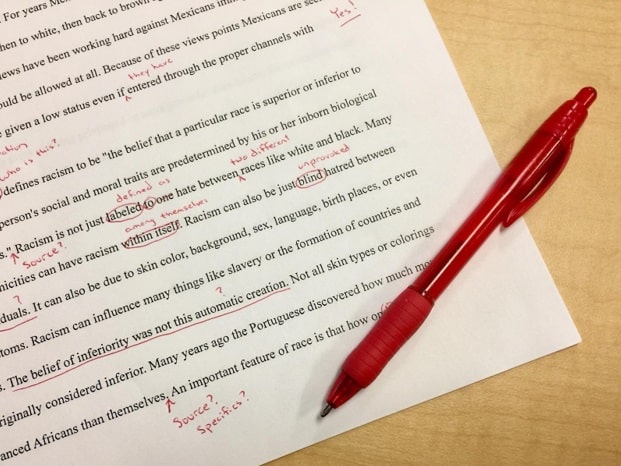Is Copy Editing the Same as Proofreading? A Detailed Explanation
How would it look if a reader finds a spelling mistake on the first page of your book? It will raise questions about the credibility and authenticity of your book. Therefore copy editing and proofreading are important to secure an author’s image. Every published excerpt and text you read goes through different quality assurance steps before publishing. Proofreading and copy editing are the final steps to publishing any book, paper, or literature. Although their end goal is the same, these fields are different. Copy Editing vs. Proofreading is more comprehensive and detail-oriented while proofreading deals with the technical aspects of the text. A copy editor has to work on the grammar and structure of the sentences so that it makes sense. Whereas a proofreader will monitor spelling and punctuation.
Table of Contents
If you are a budding author or work in a publishing firm, you may have encountered a copy editor and a proofreader. Although they work on similar prerequisites, their roles and responsibilities differ. Many writers often get confused with it and modify the text with light copy editing. Therefore, you should know the difference between the two to ensure your book is in the right hands. This blog will explain the key differences between their fields and why they are necessary.
Why Is it Necessary to Publish a Book?
Writing uses several filtering or corrective procedures to get the best possible results. Copy editing is also one of these filters that occurs alongside writing. It refers to cleaning a write-up for better readability and clarity. In its broadest sense, this step is essential to show consistency in a write-up. The text is heavily lined up, making different tweaks and omissions to make it more comprehensive.
A trained copy editor will tailor every write-up aligned with the publisher’s guidelines and explain the gist of your topic. Copyediting is meant to refine your work before it is typeset. It corrects grammatical typos, syntax, poor word choice, and inconsistent tone or writing style. Copy editing is necessary to avoid any hurdles during distribution or marketing.
As a write-up’s first reader, an editor must assess it critically. A copy editor has the following responsibilities.
- Check factual information such as time, date, place, or future/past events.
- If percentages, taxes, or Maths are involved, confirm that their calculations and formulations are correct.
- Evaluate the write-up for compliance with the moral standards of the publisher and societal ethics.
- Makes your content look free and libel, without any third-party influence.
- Ensure a smooth flow of sentences to make them understandable.
- Trim unnecessary descriptors, adverbs, articles, and other words to make it precise and clear.
- Cutdown content to fit in a particular text box or layout.
- Convert complex quotes, terms, and jargon into easier language.
- Correct grammar, spelling, and sentence structure.
- Aligning your prose to the set style. For example, APA, Chicago, or AP.
Copy editors work as quality control managers for authors. They work on the technical terms and the subjective aspects of a text body. Making them indispensable members of the writing community.
Why Is Proofreading Necessary to Publish a Book?
Proofreading comes after copy editing. It is the concluding step of biblical quality assurance. It is the last chance to correct typos or punctuation errors before the book goes for publishing. Proofreading involves comparing a typeset document against a copyedited document. It verifies its coherence and correctness. Proofreading confirms whether the copy editor’s instructions were correctly implemented in the text.
If you are a self-publishing author, proofreaders for hire can help you avoid any mistakes during formatting or printing. They ensure that your book complies with the publishing demands and look for errors that might have slipped through the cracks during the editing stages.
A proofreader has the following responsibilities in the writing and publishing forms:
- Proofreaders look out for faulty grammar. Incorrect pronouns, passive voices, confusing adjectives with adverbs. Mismatched conjunctions such as using nor with neither.
- They also look out for capitalization mid sentences.
- Incorrect spacing between headings and paragraphs. Or adding unnecessary hyphens between joining words.
- Monitoring Inconsistent font size and formatting errors.
You can find different types of proofreaders for hire, such as print media, academic, and business proofreaders. These proofreaders know their particular style and guide the text in that direction. However, revisions in proofreading should be limited to a minimum since revising a type set document can be expensive.
Copy Editing vs. Proofreading: What’s the Difference?
Both copyediting and proofreading are overlapping fields. Although both belong to mechanical editing, they have considerable differences. Copy editing works on sentence levels, maintaining the logical flow of the topic while relating to the reader’s intent. While proofreading is solely an objective step to remove mechanical errors.
Copy editing ensures that the text is not deviating from its original theme. There must be no content gaps, plot holes, and irrelevant examples dragging the topic. Copy editing works on four Cs, clarity, coherence, correctness, and consistency.
On the other hand, proofreading cleans up mechanical errors and irregularities left behind during the editing process. Proofreaders don’t concern themselves with the fluidity or cohesiveness of the text, whether a paragraph matches the story in the first paragraph. Whether the statements are factually correct or the mathematical terms are logical. They only care about the word they see on the page and how they should look.
Copy Editing vs. Proofreading: Which Do You Need?
You need both of them to achieve quality.
If you are a self-publishing author launching your new book, you can only create an impact once your book is edited and proofread. Writing is a complex process, it evolves with new ideas and theories. A manuscript must be scrutinized from both subjective and objective points of view to achieve quality. Copy editors and proofreaders for hire can help you build your image in the reader’s eyes. Our team of experienced and trained editors and proofreaders can help you create an impact with your book.
Lou Martins is a writer and entrepreneur with years of experience in “Amazon book publication” and selling on Amazon. A writer by day and a reader by night. Outside of work, she enjoys traveling and spending time with family and friends because work and life balance is important.










